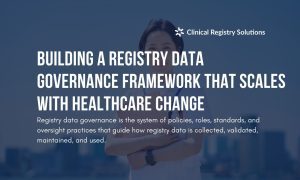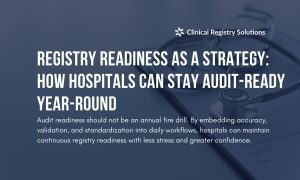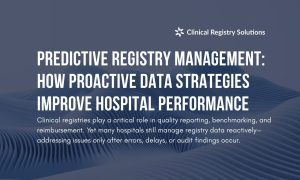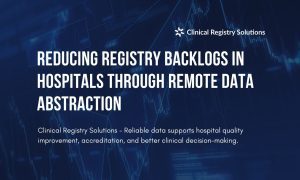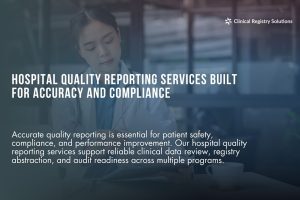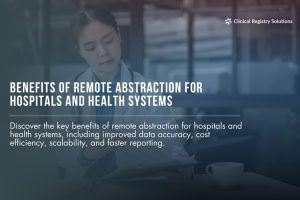- Essential Role of Data Abstraction: Critical for regulatory compliance, patient outcomes, and operational efficiency in hospitals.
- Challenges of In-House Abstraction: Time-intensive, high costs, and risk of errors leading to non-compliance.
- Benefits of Outsourcing: Improved accuracy, cost savings, scalability, and reduced staff burden.
- Choosing a Partner: Focus on expertise in registries like ACC, STS, CMS; track record in compliance; and customizable services.
- Future Outlook: Outsourcing enhances hospital performance in a complex healthcare environment.
In today’s healthcare landscape, data abstraction plays a critical role in ensuring hospitals meet regulatory requirements, improve patient outcomes, and optimize operational efficiency. However, the growing complexity of clinical registries, compliance standards, and data management has led many hospitals to outsource data abstraction to expert third-party providers.
With industry leaders like Clinical Registry Solutions and Quality Health Data setting the standard for outsourced data abstraction, hospitals are realizing the cost, quality, and efficiency benefits of making the shift. But why is outsourcing becoming the preferred solution? Let’s explore.
What Is Data Abstraction, and Why Is It Essential?
Clinical data abstraction involves extracting, analyzing, and submitting patient data to registries such as:
- The American College of Cardiology (ACC)
- The Society of Thoracic Surgeons (STS)
- The Centers for Medicare & Medicaid Services (CMS)
Accurate and timely data abstraction is crucial for:
- Hospital performance benchmarking
- Quality improvement initiatives
- Compliance with accreditation bodies
- Enhanced patient care and research
The Challenges of In-House Data Abstraction
Traditionally, hospitals have relied on internal teams for data abstraction, but this approach presents several challenges:
- Time-Intensive Workload: Manually abstracting patient data requires specialized skills and extensive time, pulling staff away from direct patient care.
- High Operational Costs: Hiring, training, and retaining skilled data abstractors is expensive, especially with increasing demand for quality reporting.
- Risk of Errors & Non-Compliance: Inconsistent abstraction can lead to inaccurate data submissions, affecting hospital rankings and reimbursements.
With these challenges in mind, outsourcing data abstraction has emerged as a cost-effective, scalable, and quality-driven solution.
Why More Hospitals Are Outsourcing Data Abstraction
1. Increased Accuracy & Compliance
Companies like Clinical Registry Solutions utilize AI-driven technology and highly trained abstraction specialists to ensure precision and compliance with registry requirements.
- Automated workflows reduce human errors
- Expert teams stay updated on evolving registry guidelines
- Improved data integrity leads to better hospital performance metrics
2. Significant Cost Savings
Outsourcing eliminates the need for full-time in-house staff, reducing overhead costs such as:
- Salaries & benefits
- Training & certification expenses
- Software & compliance monitoring
Hospitals can reallocate budgets toward patient care improvements while ensuring top-quality data abstraction.
3. Scalability & Flexibility
Outsourced data abstraction providers offer on-demand services tailored to fluctuating hospital needs. Whether handling high-volume patient records or specialized registry submissions, outsourcing ensures hospitals can scale operations without hiring additional staff.
4. Reduced Staff Burden & Improved Care Delivery
By outsourcing data abstraction, hospitals allow their in-house clinical teams to focus on:
- Direct patient care instead of administrative tasks
- Clinical quality improvement initiatives
- Registry participation without overwhelming staff
How to Choose the Right Outsourcing Partner
When selecting a data abstraction partner, consider:
- Expertise in Your Required Registries: Ensure the provider specializes in ACC, STS, CMS, and specialty registries.
- Compliance & Accuracy Track Record: Verify their quality assurance processes and adherence to regulatory standards.
- Scalability & Customization: Look for flexible services tailored to your hospital’s unique needs.
Final Thoughts: The Future of Data Abstraction in Healthcare
By making the shift, hospitals can enhance accuracy, reduce costs, improve patient care, and streamline operations—ensuring long-term success in an ever-evolving healthcare landscape.
Ready to optimize your hospital’s data abstraction process? Learn how Clinical Registry Solutions can help you maximize efficiency and compliance today. Visit www.clinicalregistrysolutions.com for more insights.
FAQ
What is clinical data abstraction?
Clinical data abstraction is the process of extracting, analyzing, and submitting patient data from medical records to various clinical registries to support quality reporting, compliance, and performance improvement.
Why should hospitals outsource data abstraction?
Outsourcing helps hospitals save costs, improve data accuracy, ensure regulatory compliance, and allow clinical staff to focus on patient care rather than administrative tasks.
How does outsourcing improve compliance with registries like ACC and STS?
Outsourced providers like Clinical Registry Solutions use AI tools and expert teams to stay current with registry guidelines, reducing errors and ensuring timely, accurate submissions.
What are the cost benefits of outsourcing data abstraction?
It reduces expenses related to hiring, training, and maintaining in-house staff, while eliminating the need for specialized software and ongoing compliance monitoring.
How do I choose the best data abstraction outsourcing partner?
Look for providers with proven expertise in your specific registries, strong compliance records, scalable services, and customizable solutions to fit your hospital’s needs.
